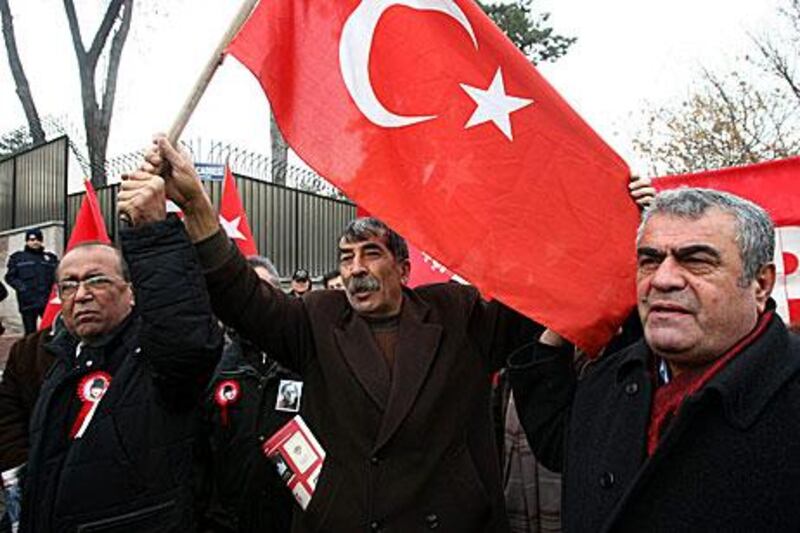Turkey reacted with fury yesterday to a French law making it illegal to deny that a massacre of Armenians in 1915 was genocide.
Ankara refrained from immediate sanctions against its Nato ally but the prime minister, Recep Tayyip Erdogan, said the "footsteps of fascism" could be heard in Europe.
He slammed the French bill as an expression of a "mentality of the Middle Ages" that violated European values, such as the freedom of speech.
The French senate approved the law on Monday. The lower house did so last month.
"The proposal adopted in France is tantamount to discrimination, racism and a massacre of the freedom of thought," Mr Erdogan said.
"This bill is completely null and void for us."
The prime minister said his government had prepared a package of sanctions if needed, but would not immediately retaliate. "We are still in the phase of patience," he told the parliamentary group of his ruling Justice and
Development Party (AKP) in a televised speech. "We have not given up hope."
The 127-86 senate vote means the law will take effect once the French president, Nicolas Sarkozy, gives his official assent. However, there are moves to assemble the 60 dissenting senators needed for a challenge to
France's constitutional council on the ground that the measure would breach the right to free expression.
Armenia and several other western countries, as well as international experts, agree that the Ottoman Armenians were victims of genocide in the final phase of the Ottoman Empire in 1915 and that up to 1.5 million members of the Christian minority were killed in massacres and death marches.
France recognised the killings as genocide in 2001, but Turkey rejects the term and says the deaths were the result of a relocation effort under wartime conditions.
Possible sanctions against France include withdrawing the Turkish ambassador, expelling the French ambassador from Ankara and closing Turkey's harbours and airspace to French warships and warplanes.
Ministers have also raised the possibility of taking France to the European Court of Human Rights.
While he did not announce concrete steps against France, Mr Erdogan's speech contained sharp personal attacks against Mr Sarkozy, whom he accused of trying "to collect votes with the help of enmity against Turks".
In France, as in Turkey, there is suspicion that political calculations played a part in Mr Sarkozy's strategy.
An estimated 600,000 French people are of Armenian origin. Mr Sarkozy's critics say he may have been courting their support as he approaches tricky presidential elections in April. Many Turks also resent Mr Sarkozy for his strong opposition to Turkish entry into the European Union.
Mr Erdogan said Mr Sarkozy's father was a descendant of Jews who faced persecution in Spain in the 15th century and were taken in by the Ottoman Empire.
The French vote was greeted with unanimous rejection in Turkey. Kemal Kilicdaroglu, the opposition leader in Ankara, called the decision a shame and said the government should take "decisive" action.
Referring to French abuses in Algeria, Devlet Bahceli, leader of the right-wing Nationalist Movement Party (MHP), said France should take a look "at its own smelly history" before judging Turkey.
Despite the stinging rhetoric, Mr Erdogan's speech was likely to be met with relief in France. Shortly before the Turkish prime minister spoke, Alain Juppé, the French foreign minister who had argued against the law, appealed to Ankara to remain calm.
Mr Juppé, speaking on Canal+ television yesterday, said he was sure France and Turkey would rebuild a constructive relationship.
"We need Turkey, Turkey needs us, so I think that realism will prevail over passion."
He said the rift was "excessive" and offered a hand of friendship to Turkey, "this great country, this great political and economic power".
Engin Solakoglu, a spokesman at the Turkish embassy, said France was "in the process of losing a strategic partner".
But some Turks have called on their country to face its past, arguing that more openness about the events of 1915 would make Turkey less vulnerable to crises such as this.
"If we go on defending instead of really understanding what happened in 1915, we will continue to fall victim to opportunist idiots like Sarkozy," Suat Kiniklioglu, a member of parliament for the AKP, said on Twitter.
tseibert@thenational.ae






